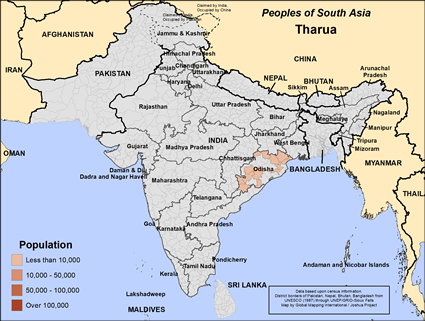The Tharua people live in India, primarily in Odisha where they speak Odia, the local language. The Tharua have long been connected to the land, with a history of farming and interaction with the natural environment. Over time, they have adapted to various socio-political changes, including the effects of British colonialism and the post-independence period, while maintaining their distinct identity.
The Tharua people primarily engage in subsistence agriculture, growing crops such as rice, wheat and maize. Many also rely on forest resources, including the collection of firewood, medicinal plants and other non-timber forest products. Their villages are typically located in the plains and foothills, with houses constructed from materials like mud, brick and thatch.
Social life revolves around family and community activities, with a strong emphasis on cooperation in agricultural work and communal events. While education access has improved, challenges remain, particularly in rural areas where schools are often under-resourced. Healthcare services are generally available, but disparities exist, especially in remote villages where access to medical care is limited.
The Tharua people predominantly practice Hinduism, which deeply influences their daily lives and spiritual practices. They worship a variety of Hindu deities, with special reverence for gods and goddesses associated with agriculture and nature. Temples and local shrines serve as important centers for religious activity, and festivals such as Diwali, Holi and local harvest festivals are celebrated with community participation. Rituals and ceremonies are integral to their religious life, marking significant life events and agricultural cycles.
The Tharua people face challenges related to economic opportunities, education and healthcare. Many continue to rely on subsistence farming and forest resources, with limited access to alternative sources of income. Educational facilities, while improving, are often inadequate in rural areas, leading to low literacy rates and limited opportunities for higher education. Healthcare services, though present, are often insufficient in remote areas, resulting in poor health outcomes and a reliance on traditional medicine. Infrastructure improvements, including better roads, sanitation and access to clean water are essential for enhancing their quality of life. Initiatives focused on sustainable development, education and healthcare are crucial for the long-term progress of the Tharua people.
Pray that forgiveness will lead to spiritual freedom that will spread from people group to people group. Pray that soon Tharua disciples will make more disciples. Pray for a spiritual hunger that will not be satisfied until they embrace the only savior.
Scripture Prayers for the Tharua in India.
Northern India Ethnographic Studies. (2023). Ethnographic Overview of the Tharua People. Retrieved from northernindiaethnographicstudies.org
UNDP India. (2023). Development Needs of Rural Communities in Northern India. Retrieved from in.undp.org
| Profile Source: Joshua Project |











